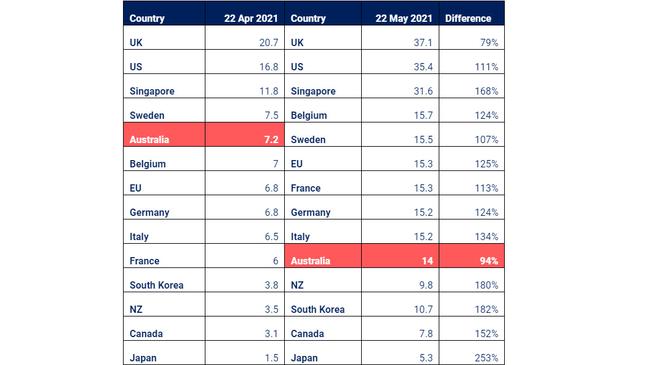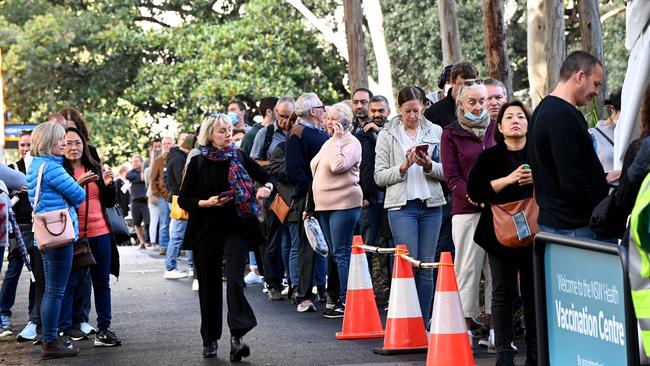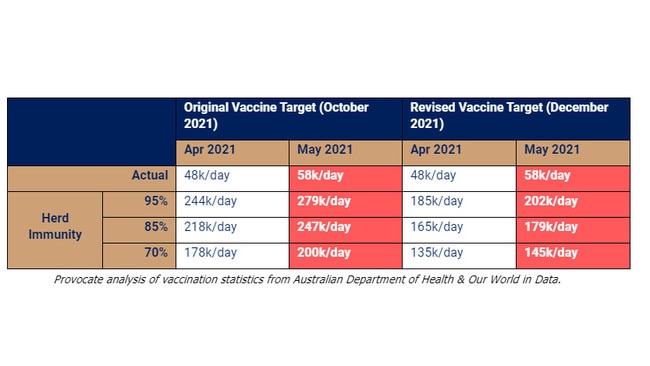New data reveals Australia is falling further behind in Covid-19 vaccine rankings
Australia is falling further and further behind in one key Covid-19 battleground after new figures revealed other nations were forging ahead.
The nation’s leaders continue to spruik how they are forging ahead with the Covid-19 vaccine rollout, but new data reveals Australia is falling further behind.
Australia fell five places in the last month from fifth to 10th among the 13 other progressive nations it is benchmarked against by the Australian Department of Health each month.
Germany, France, Italy and Belgium all leapfrogged Australia in the monthly standings. The data compares each nation at the same point in their vaccination rollouts, taking into account when each country started administering Covid jabs.
It measures success on the number of doses given per 100 people.
While Australia’s vaccination rates soared from 7.2 doses in April to 14 jabs per 100 people in May, the nation has still fallen behind.
Findings from the May edition of Provocate’s VaxEnomicTM Forecaster revealed lower-ranked countries like New Zealand, South Korea, Canada and Japan grew at double the pace of Australia during their third month of the rollout.

The latest data was recorded by the health department on May 22 and marked day 89 of Australia’s rollout.
About 4.2 million doses have been administered in Australia so far.
Provocate managing director Troy Bilsborough said this was well down on the 200,000 daily vaccinations needed to meet the government’s target of finishing the rollout by the end of the year.
“Australia’s lagging rate of vaccination at home is having a significant impact on its global standing as well as the risk of market share losses to competitor countries that reopen faster,” Mr Bilsborough said.
“For example, Australia has one of the slowest start dates and lowest vaccination rates of all G20 nations.”
He said vaccine demand, sparked by fears surrounding the Victorian lockdown, would only be temporary.
“Our outlook remains unchanged. Until Australia is consistently averaging at least one million jabs in arms per week, every week, then business should plan for a vaccine rollout completion closer to 2023 than 2021,” Mr Bilsborough said.
According to the Provocate forecast, about 13 million additional vaccinations are needed for Australia to reach the top 95 per cent rate of herd immunity.

It is unclear what level of herd immunity the federal government is aiming to achieve, but gold standard for infectious diseases is also 95 per cent.
The federal government’s sluggish rollout has been widely criticised.
Finance Minister Simon Birmingham on Tuesday accepted the vaccination rollout had “not gone as we would have hoped” but pointed to supply delays from Europe and shifting medical advice on the AstraZeneca vaccine.
Medical advice does not warn against administering AstraZeneca, which is produced onshore, to people aged over 50, but the jab requires a 12 week wait between its first and second doses.
Mr Birmingham said the delay partly accounted for the sluggish rollout numbers but insisted the government was prioritising aged care residents.

“There have been disruptions to the vaccination rollout, that is 100 per cent acknowledged,” he told the ABC on Tuesday.
“They are just the facts, and we’ve had to respond to those facts. In responding to those facts, we’ve made sure that we still pushed on with aged care residents as the priority of Australia’s vaccination rollout.”
The latest concern is an outbreak in Victoria’s aged care sector, leaving the public confused about why the state’s most vulnerable have not been fully vaccinated.
A significant number of aged care residents in Victoria are choosing to opt out of the coronavirus vaccine, according to the Health Minister.
Up to 15 per cent of residents in aged care haven’t been vaccinated because they or family members haven’t consented to the jab, federal Health Minister Greg Hunt said on Sunday afternoon.
The Department of Health said the nation’s vaccination rate had doubled over a four-week period, from just over 300,000 to 630,547 Australians receiving the jab in the past week.
The department said the first million vaccinations took 47 days, the second million 19 days, the third 17 days and 13 days for the most recent million.


